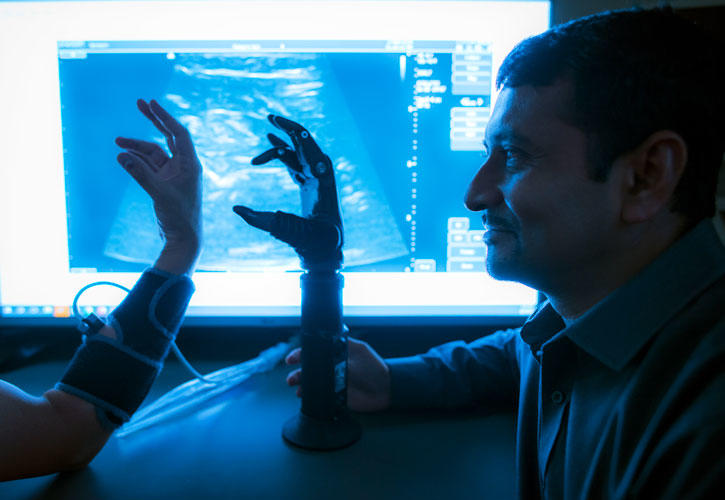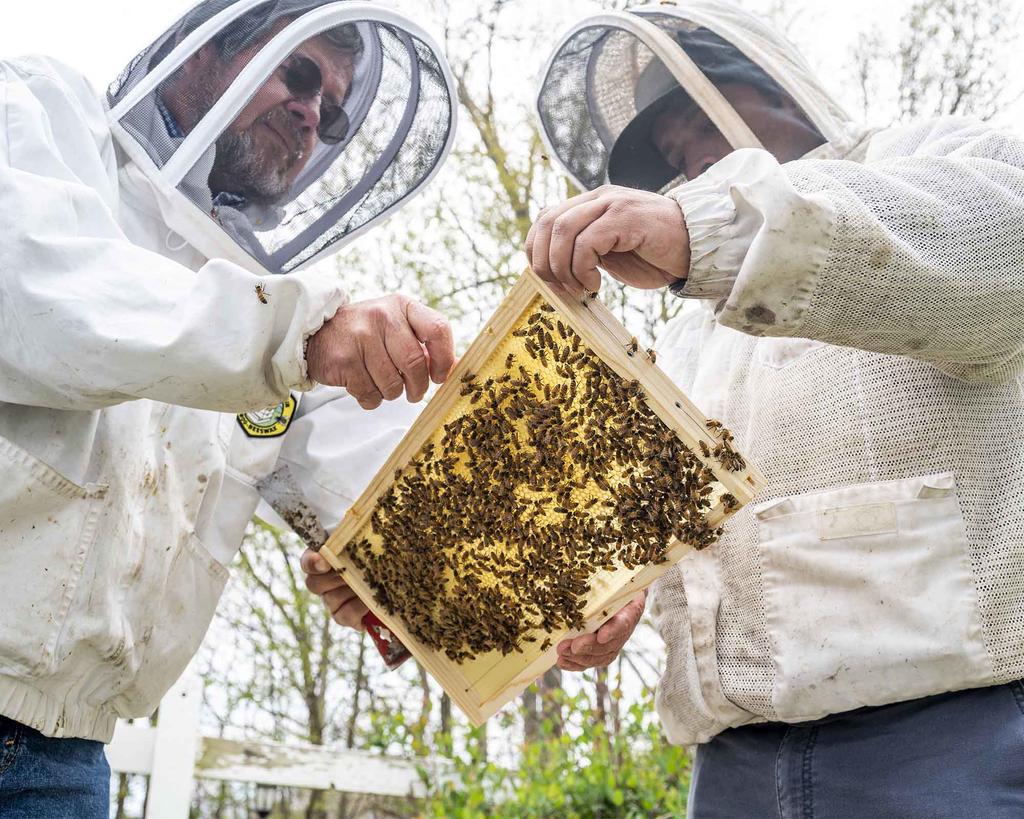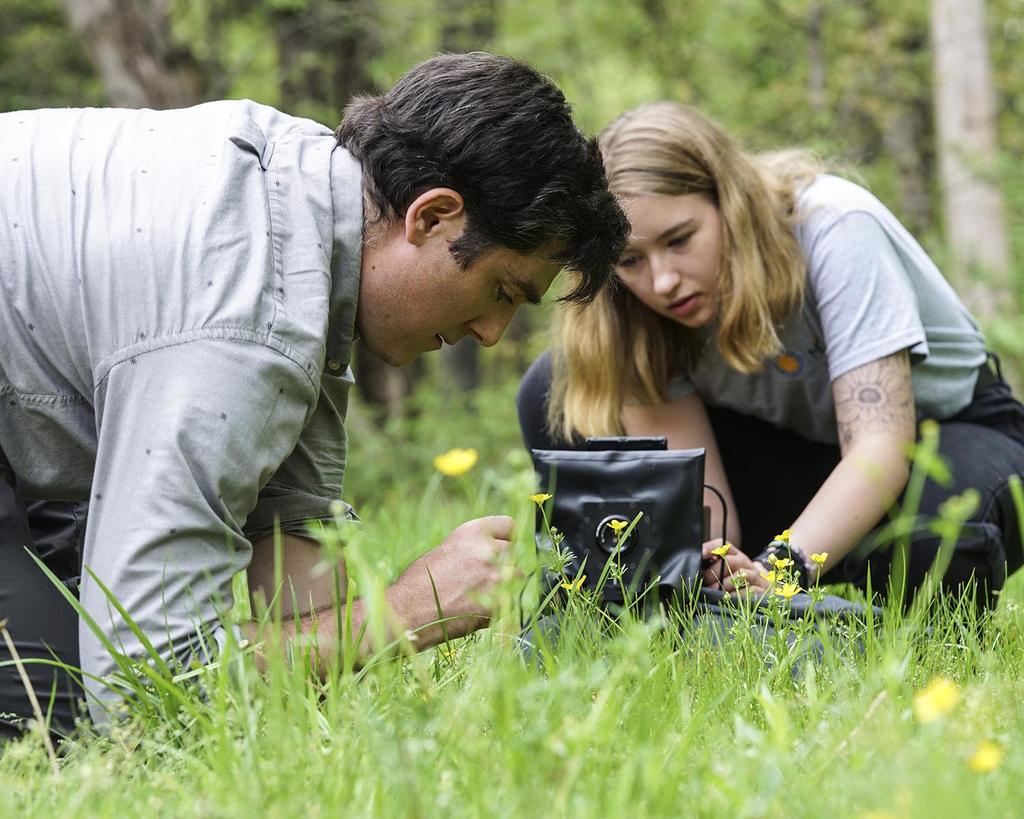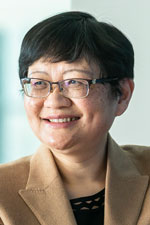George Mason University conducts research that goes beyond the desire to know and understand; we want to make a difference. Research is vital to expanding our knowledge, sparking new ideas, and developing innovative techniques that have an impact on society, the economy, and the environment. It’s a critical part of the university’s purpose and mission. Mason’s research expenditures grew by 55% between 2017 and 2022, driving discovery and the creation of new knowledge to meet the toughest current and future challenges and creating opportunities yet to be imagined.
Varied Fields Work Together to Find All-Encompassing Solutions
Mason encourages the creation of multidisciplinary teams. We know researchers in different disciplines can collaborate to find solutions more quickly, and open pathways to other possibilities. The university leverages the power of these collaborations in such areas as:
-
The Institute for Biohealth Innovation takes a multidisciplinary approach to develop technologies to predict, prevent, treat and eradicate disease and improve care.
-
The Institute for a Sustainable Earth conducts integrative research in the natural, social, computational, and data sciences, engineering, and humanities.
-
The Institute for Digital InnovAtion will incubate new digital products and services. IDIA will be in a new 400,000-square-foot facility at the Arlington Campus.
-
The Center for Adaptive Systems of Brain-Body Interaction unites scientists, engineers, and health care professionals to research ways to improve the quality of life of people with disabilities.
-
The Quantum Science and Engineering Center's physicists, engineers, and data scientists use artificial intelligence and machine learning to design new quantum materials.
-
The Criminal Investigations and Network Analysis Center equips investigators with state-of-the-art expertise, methods, tools, and technologies to combat transnational crime.
-
The Center for Advancing Human-Machine Partnership works to restructure and optimize reciprocal relationships between humans and assistive computing systems.
-
The Center for Resilient and Sustainable Communities aims to help communities with rebuilding, as well as with preparations to prevent damage.
-
The Center for Humanities Research fosters innovative, consequential research in the humanities and humanities-related disciplines, promotes the humanities' value as a public good, and enhances the work's visibility and impact.




Nationally Recognized Experts Lead Cutting-Edge Research
Mason is advancing knowledge across all disciplines. Our researchers' discoveries change lives and change the world. Some examples:
Detecting and Fighting COVID-19
Lance Liotta, co-director, co-founder and medical director of the Center for Applied Proteomics and Molecular Medicine (CAPMM) within Mason’s College of Science, and his colleagues are using an improved COVID-19 antibody test developed as part of a Mason clinical study to measure the body’s response to a vaccine. Their study of COVID-19 antibodies in previously infected people reveals the human immune system’s strong ability to fight the virus, even if they showed minimal or no symptoms. Based on months of study of patients who were naturally infected, Liotta and his team were able to verify that patients’ antibodies lasted longer than initially first believed and that they potentially helped prevent those patients from getting sick again.
Komodo Dragon Blood Could Hold Key to Cures
Barney Bishop and Monique van Hoek created a new way to kill antibiotic-resistant bacteria while spurring the body’s cells to heal cuts faster by researching the germ-fighting abilities of Komodo dragon blood. The Defense Threat Reduction Agency (DTRA), a federal body, funded the work through a $7.57 million contract. The study's goals were to discover new bacterial infection-defeating compounds in the blood of Komodo dragons and the crocodilian family of reptiles, which includes American alligators. These reptiles eat carrion and live in bacteria-rich environments but rarely fall ill, suggesting they have strong innate immunity. The research was published in the Nature-partner journal NPJ Biofilms and Microbiomes. In August 2019, they and their collaborators released findings on sequencing the Komodo dragon genome, revealing multiple clusters of antimicrobial peptide genes that could prove instrumental in the fight against multi-drug resistant bacteria.
Improving the Design of Ships
Dr. Chi Yang, a professor of computational fluid dynamics in the physics and astronomy department, leads a research group that has developed a computational tool, SimDShip, to accomplish innovative, simulation-based design of ship hull forms. By enabling hydrodynamic optimization at early stages of ship design, SimDShip allows researchers to efficiently explore and evaluate a wide range of novel hull forms, ultimately shortening the design cycle and saving fuel consumption costs. Designing ships with high energy efficiency is economically desirable because ships that require less power consume less fuel, or they can sail at a faster operating speed with the same fuel consumption. SimDShip, funded by a three-year, $600,000 grant from the U.S. Office of Naval Research (ONR), will be incorporated into the Integrated Hydrodynamics Design Environment (IHDE) within the U.S. Navy’s CREATE-Ships Project.
Getting Guidance from 'Godfather of Biodiversity'
Thomas Lovejoy, "the Godfather of Biodiversity," is a professor in the Environmental Science and Policy Department. The Smithsonian-Mason School of Conservation houses the Thomas E. Lovejoy Library, and Lovejoy also serves as scientific director of Mason's Institute for a Sustainable Earth. Before coming to Mason, he held the biodiversity chair at the Heinz Center for Science, Economics and the Environment and was president from 2002 to 2008. In 2016, he was selected as a U.S. science envoy by the State Department. A trip to the Amazon influenced him to establish a conservation program at the World Wildlife Fund-U.S., which he led from 1973 to 1987. He is founder of the public television series Nature. In 2009, he was appointed conservation fellow by the National Geographic Society. He has also served on the science and environmental councils under Presidents Ronald Reagan, George H.W. Bush, and Bill Clinton, and he currently serves as senior fellow at the United Nations Foundation. In September 2019, Virginia Gov. Ralph Northam recognized Lovejoy's work with the Outstanding STEM Award.
Fighting Crime Across International Borders
Louise I. Shelley, director of the Terrorism, Transnational Crime, and Corruption Center (TraCCC), and Naoru Koizumi, director of research within the Schar School of Policy and Government, lead multidisciplinary research teams investigating and disrupting illicit supply networks. TraCCC is the first center in the nation devoted to understanding the links among terrorism, transnational crime, and corruption. The center and its international research partners study: human smuggling and trafficking; nuclear proliferation issues; the links between crime and terrorism; money laundering and other financial crimes; the impact of organized crime and terrorism on legitimate business; and environmental crimes.
Leading a Division of the Smithsonian
Spencer Crew worked behind the scenes as a guest curator for six years to bring an exhibit at the Smithsonian Institution's National Museum of African American History and Culture to life, and in June 2019, he was named interim director of the museum. He created one of the three history exhibitions for the facility, all of which chronologically tell the story of blacks in the United States — from the Middle Passage to the election of former President Barack Obama. Crew became a guest curator for the museum largely because of his past experience as a curator, historian, and director at the Smithsonian’s National Museum of American History. He created an exhibit about African American migration called “Field to Factory,” which was displayed for more than 20 years. His part of the exhibit at the African American History and Culture museum, “Defending Freedom, Defining Freedom: Era of Segregation 1876 to 1968” covers the post-Reconstruction period to the assassination of the Rev. Dr. Martin Luther King Jr.
Studying T-Cells to Target HIV
Yuntao Wu's is the lead scientist on a research team that helped identify a T cell marker that could help lead to improved treatment for HIV and cancer patients. The research focuses on cofilin, a protein that regulates cells to fight infection. In an HIV-infected patient, cofilin dysfunction is a key factor in helper T cell defects, according to the research published in the journal Science Advances. Helper T cells augment the body’s immune response by recognizing the presence of a foreign antigen, then helping the immune system mount a response. Wu and his team found that patients with HIV have “significantly lower” levels of cofilin phosphorylation than healthy patients. Their findings suggest that a lasting immune control to HIV isn’t likely to come from antiretroviral therapy alone.
Increasing Flight Safety
The Center for Air Transportation Systems Research received two grants from NASA to study airline accidents and accident-prevention strategies. The grants have led to the research and creation of technology that would advise pilots of potential accident situations. Lance Sherry, director of the center, and John Shortle are the primary investigators. The team developed technology that uses machine-learning algorithms to process massive amounts of flight and weather data collected about anomalies that occur during flights across the country. These data are then used to create tips or advisories for pilots to prevent them from encountering potential accident scenarios. The team is also applying these ideas to autonomous vehicles.
Developing Technology for More Effective Police Work
Cynthia Lum and Christopher Koper conduct research in such areas as technology, evidence-based crime policy, translational criminology, and assessing federal agencies' security efforts. They developed the Evidence-Based Policing Matrix (with PhD student Cody Telep) and the Matrix Demonstration Project, tools to help police incorporate research into their strategic and tactical skills. The Matrix organizes moderate to very rigorous evaluations of police interventions visually, allowing agencies and researchers to view the field of research in this area. It's updated with all qualifying studies each year. Drs. Lum and Koper have also written a book about their work, Evidence-Based Policing: Translating Research into Practice, published by Oxford University Press. On Sept. 17, 2019, Drs. Lum and Koper led the Center for Evidence-Based Crime Policy's presentation, “Countering Mass Shootings in the United States,” to members of Congress.













